Republican members of the House Financial Services Committee continued to lay the foundation for a regulatory relief bill for community banks, specifically a rollback in regulations included in the Dodd-Frank Act, during a hearing Tuesday before the panel’s Subcommittee on Financial Institutions and Consumer Credit.

“There seems to be a two-speed economy; one for the largest firms and people with the best credit, and another speed for everyone else,” said U.S. Rep. Keith Rothfus (R-PA).
He expressed concern at data provided by the Federal Reserve Bank of St. Louis showing community bank lending was 150 percent higher than large national banks in the six years before passage of the 2010 bank bill, but has been 80 percent below large bank lending since then.
The biennial effort at regulatory relief for banks represents a continued attempt by GOP lawmakers aimed at repeal or stripping away portions of Dodd-Frank, which was passed by the Democratic majority in Congress in the wake of the financial crisis. Financial Services Committee Chair Jeb Hensarling has led the repeal effort for the past few years.
Scott Heitkamp, CEO of ValueBank Texas, said about 2,000 of the nation’s community banks have disappeared since 2009 and an historically few new de novo banks have been chartered to replace them, a trend he attributed to the “chilling effects” of rising regulatory compliance costs. He said data shows that 1.1 million mortgages were killed in 2015 by tight credit directly related to the costs of regulatory compliance.
Heitkamp, who was testifying on behalf of the Independent Community Bankers of America (ICBA), submitted a list of 40 recommendations his group supports for regulatory relief. Those include tax cuts, amendments to the Bank Secrecy Act, loosening of capital standards, and reforms to the Consumer Financial Protection Bureau (CFPB), which was created by Dodd-Frank, and exempting community banks from Dodd-Frank’s Volker rule.
ICBA’s recommendations also include allowing CFPB to exempt or tier regulatory requirements for community banks and/or community bank products and services; restructuring the CFPB to a five-member commission rather than a single director; and easing the ability of the Financial Stability Oversight Council to veto a CFPB rule.
Asked by Subcommittee Chairman Blaine Luetkemeyer (R-MO), “Is there plenty of money to lend?” Heitkamp answered, “There’s plenty of liquidity to lend, we’re just looking to place it.”
J. David Motley, president of Colonial Savings, told the panel that while Dodd-Frank has made mortgage banking safer in many ways, in other ways it has reduced the availability and affordability of mortgage credit for many families.
“Regulatory uncertainty, combined with heightened enforcement risk have forced many responsible lenders to reconsider their ability to lend to the full extent of the credit box,” said Motley, who was appearing on behalf of the Mortgage Bankers Association. He urged rollbacks in Dodd-Frank’s “ability to repay” and qualified mortgage rules, or QM, which restrict which mortgages may be sold on the secondary market.
But Michael Calhoun, president of the Center for Responsible Lending, a liberal advocacy that helped draft portions of Dodd-Frank, questioned the validity of some of the lenders’ conclusions.
“Mortgage lending in particular continues to steadily improve,” Calhoun said. “Small banks are playing an important and growing role in the recovery. Contrary to theories that the Dodd-Frank Act has stifled growth, the financial sector has had record profits. In 2016 U.S. financial institutions had total annual profits of $171.3 billion, the highest level since 2013.”
Community bank profitability, according to Calhoun, has rebounded strongly and meets pre-recession levels. By the end of 2015, more than 95 percent of community banks were profitable, compared to less than 78 percent in 2010.
And the most recent Federal Deposit Insurance Corp. report from the 2016 third quarter notes that the percentage of unprofitable community banks sunk to 4.6 percent, which is the “lowest percentage since the third quarter of 1997.” The decline in the number of small lenders, he said, cannot be reasonably attributed to Dodd-Frank or CFPB regulations, as the number of community banks has declined every single year since 1984.
U.S. Rep. Andy Barr (R-KY), said there is widespread agreement that small business lending has increased post-Dodd-Frank, but the brunt of the loans are going to larger borrowers in urban areas. “Lending in rural America is way off. That’s where the concern is,” Barr said.
Holly Wade, director of Research and Policy Analysis for the National Federation of Independent Businesses, said, “There’s just a lack of demand in (those) business communities.”
Motley bemoaned the “dramatically increased costs” of regulatory compliance for his bank since Dodd-Frank, asserting they have pushed the costs of originating a single mortgage to $6,500 from $1,900 prior to the recession.
“All that money going for compliance could have gone to customers,” said U.S. Rep. Roger Williams (R-TX).